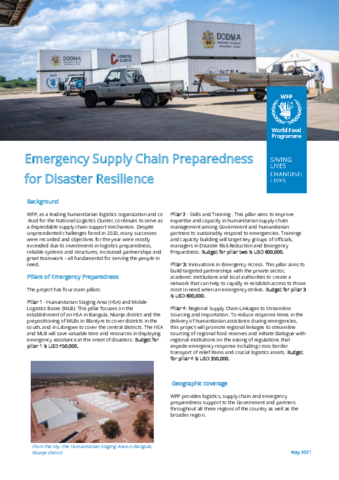
WFP, as a leading humanitarian logistics organization and co -lead for the National Logistics Cluster, continues to serve as a dependable supply chain support mechanism. Despite unprecedented challenges faced in 2020, many successes were recorded and objectives for the year were mostly exceeded due to investments in logistics preparedness, reliable systems and structures, increased partnerships and great teamwork – all fundamental for serving the people in need.
- Establishment of a Humanitarian Staging Area in Nsanje District, southern Malawi, as part of the emergency supply chain project to increase access, ensure operational continuity, and enhance national resilience during crisis.
- Support to development and adoption of a National Logistics Plan and corresponding roadmap to achieve agreed targets.
- Logistical support and assistance to 41 organizations with 600 m2 amount of storage space, handling of cargo, and dissemination of 55 information management products.
- In close coordination with entities such as the Ministry of Transport and Public Works, the Department of Disaster Management Affairs, the Ministry of Health and others, WPF provided support to emergency responders in 14 districts.
- Delivery of timely humanitarian assistance including the transport and storage of personal protective equipment and other life-saving relief items.
- Set up of mobile units for health screening, isolation/treatment, and storage purposes.
- Bilateral logistics service provision including boat transports to inaccessible areas on the east bank of the lower Shire river and storage for UN and NGO partners.
- Provision of 126 trucks used by the Malawi Electoral Commission deployed nationwide to support the delivery and collection of election materials.
